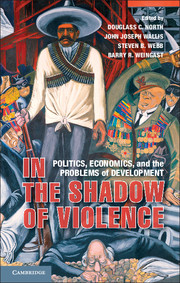Book contents
- Frontmatter
- Contents
- Contributors
- Acknowledgments
- One Limited Access Orders
- Two Bangladesh
- Three Fragile States, Elites, and Rents in the Democratic Republic of Congo (DRC)
- Four Seeking the Elusive Developmental Knife Edge
- Five Change and Continuity in a Limited Access Order
- Six India’s Vulnerable Maturity
- Seven Entrenched Insiders
- Eight From Limited Access to Open Access Order in Chile, Take Two
- Nine Transition from a Limited Access Order to an Open Access Order
- Ten Lessons
- Index
- References
Four - Seeking the Elusive Developmental Knife Edge
Zambia and Mozambique – A Tale of Two Countries
Published online by Cambridge University Press: 05 December 2012
- Frontmatter
- Contents
- Contributors
- Acknowledgments
- One Limited Access Orders
- Two Bangladesh
- Three Fragile States, Elites, and Rents in the Democratic Republic of Congo (DRC)
- Four Seeking the Elusive Developmental Knife Edge
- Five Change and Continuity in a Limited Access Order
- Six India’s Vulnerable Maturity
- Seven Entrenched Insiders
- Eight From Limited Access to Open Access Order in Chile, Take Two
- Nine Transition from a Limited Access Order to an Open Access Order
- Ten Lessons
- Index
- References
Summary
Introduction
This chapter aims to explore the practical and analytical usefulness for development policy of a new framework for interpreting the evolution and performance of political and economic institutions suggested by Douglass North, John Wallis, and Barry Weingast (NWW) in their recent book, Violence and Social Orders.
A central distinction of the framework is between open access orders (OAOs) and limited access orders (LAOs). Most contemporary theorizing and prescription on the appropriate governance arrangements for low-income countries uses as its benchmark the institutions of OAOs: elections, and more broadly pluralistic, open and competitive political arrangements; and a free market economy underpinned by the impartial protection of property rights. The corollary prescription has been to advocate for the immediate, comprehensive construction of these institutions in less developed countries.
By contrast, NWW suggest that these institutions are the outcome of a long historical process, that the relevant dynamics are those of the LAO – and that the appropriate analytical and policy challenge is to understand how “doorstep conditions” that lead to OAOs can emerge out of LAOs. In LAOs, political stability depends on effective coordination among elites on access to, and allocation of, economic rents – with competition for rents carrying with it the threat of a violent disruption of the existing social order. Only in OAOs can competition – economic and political – and stability comfortably coexist. Moreover, OAOs emerge only as the culmination of a long (and by no means inevitable) historical process through which three necessary “doorstep conditions” have been institutionalized.
- Type
- Chapter
- Information
- In the Shadow of ViolencePolitics, Economics, and the Problems of Development, pp. 112 - 148Publisher: Cambridge University PressPrint publication year: 2012
References
- 2
- Cited by

